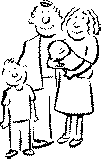|
|
|
- free your true Self to guide you |
 |
U.S. parents' baby knowledge
lacking, study finds
By Julie Steenhuysen
Reuters News Service, via
Yahoo online News - 5/3/08 |

 The Web
address of this article is
https://sfhelp.org/gwc/news/ignorant_parents.htm The Web
address of this article is
https://sfhelp.org/gwc/news/ignorant_parents.htm
Clicking underlined links here will open a
new window. Other links will open an informational popup,
so please turn off your
browser's popup blocker or allow popups from this nonprofit Web site.
If your playback device doesn't support Javascript, the popups may not display.
Follow underlined links after
finishing this article to avoid getting lost.
From 36 years'
clinical research, I propose that a core cause of most American family and social
is an inherited, unrecognized [wounds +
unawareness]
Part of the unawareness is typical
parents' lack of basic child-development and effective-parenting information.
This University of Rochester research summary seems to confirm this.
The links, emphases, and hilights below are mine. Please see my comments
following this summary. - Peter Gerlach, MSW
+ + +
Nearly a third of U.S. parents know surprisingly little about
typical infant development, and this lack of understanding can rob their
babies of much-needed mental stimulation, researchers said on Sunday.
"There are numerous parenting books telling people what to expect when they're
pregnant," said Dr. Heather Paradis of the University of Rochester Medical
Center in New York.
"But once a baby is born, an astonishing
number of parents are not only unsure of what to anticipate as their child
develops, but are also uncertain of when, how or how much they are to help their
babies reach various milestones, such as talking, grabbing, discerning
right from wrong, or even potty-training," said Paradis, who presented her
findings at a Pediatric Academic Society meeting in Honolulu.
She and colleagues analyzed parenting know-how based on a national sample of
parents representing more than 10,000 9-month-old babies.
These parents completed an 11-question
survey designed to see which parents were well prepared and which were
not.
The survey asked questions like, "Should a 1-year-old child be able to tell
between right from wrong?" and "Should a 1-year-old child be ready to begin
toilet-training?"
The correct answer to both is no.
Parents who got four or fewer correct
answers were considered to have low parenting knowledge.
VIDEO ANALYSIS
The researchers then compared these surveys with a videotaped analysis of the
same families teaching their child a new task, such as playing with blocks.
They also looked at information provided by the parents about how often they
engaged their children in enrichment activities, such as reading books, singing
songs or telling stories.
They found that 31.2 percent of the
parents had a low level of knowledge about what to expect from their child,
and this was strongly correlated with lower parental education level and income.
"The fact that almost a third of parents could only answer four out of eleven
questions correctly was very surprising to us," Paradis said in a telephone
interview.
Even when the researchers controlled for factors like the mother's age,
education, income and mental state, they still found
a significant number of parents with
unrealistic expectations about their baby's development.
And that had a negative impact on the parent-child relationship. "Parents who
had less knowledge had less quality interaction with their kids," Paradis said.
Paradis said one way to address the problem is to urge pediatricians to educate
parents during well-baby visits.
"My hope for pediatricians is that we're able to come up with some novel
approaches to educating parents in the office
setting," she said.
(Editing by Will Dunham and Xavier Briand)
Copyright © 2008 Reuters Limited. All rights reserved. Reuters shall not be
liable for any errors or delays in the content, or for any actions taken in
reliance thereon. Copyright © 2008 Yahoo! Inc. All rights reserved.

Comments
This research
summary supports a core premise in this nonprofit Web site - i.e. that many
(over half?) of average (American) parents are
psychologically
and unaware of vital relationship
and parenting knowledge, so they
can't fill their young kids' developmental needs adequately.
That seems to
produce
(GWCs) and a wide range of personal, family, and social
The summary quotes
the chief researcher, Dr. Heather Paradis as suggesting the solution is somehow
convincing pediatricians to take responsibility for educating parents on what to
expect from and for their young children. this suggests unawareness that is typical of
U.S. health-care educators and practitioners.
This could
probably raise parents' knowledge if (a) average pediatricians were willing to
take on what should be a parental responsibility, and (b) new parents were open
to receiving unsolicited instruction from them.
The real problem is that a high
number of U.S. parents are not motivated to prepare themselves for healthy
conception and
child care.
|
The unremarked problem
"beneath" that is (a) the U.S. public tacitly condones
irresponsible child conception and ineffective child care, and (b)
state and federal lawmakers, churches, and national medical
societies do not want to challenge that. The result is that millions
of vulnerable young American kids are unintentionally
(developmentally neglected), grow up to have major relationship, health and social
problems, and die prematurely.
|
If you're nurturing someone's young
kids, learn what you need to know by studying this free online
The alternative is not knowing what you need to know, and
serious psychological wounds to your vulnerable descendents. Also consider
these three practical steps any concerned
person can take to combat this tragic complacency and denial on family,
local, state, and national levels.
Pause, breathe, and reflect - why did you read this article? Did you get
what you needed? If not, what
you need? Who's
these questions - your
or
 Prior page /
Print page
/ Lesson-1
study guide
Prior page /
Print page
/ Lesson-1
study guide

site
intro /
course outline /
site search /
definitions / chat
/
contact
/
Updated
April 11, 2015
|